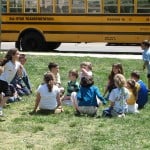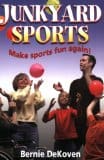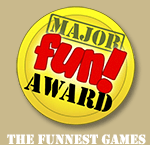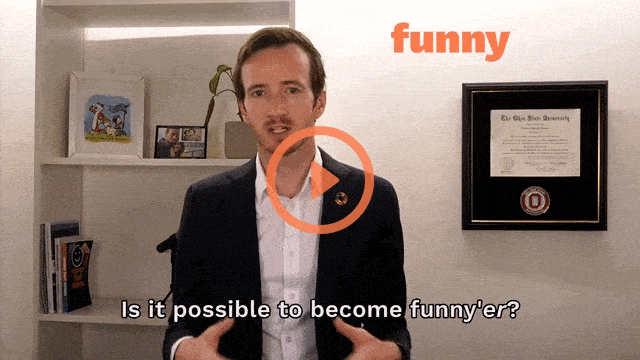Bernie DeKoven, Master Funsmith and author of DeepFun.com, JunkyardSports.com, and MajorFun.com, has over 40 years of experience with games and play for both kids and adults. I sat down with Bernie to talk about the value of play, not only in the workplace, but in life in general.

You can listen to the interview below:
Some highlights from the talk include:
- What it means to be a funsmith. (0:30)
- How teaching games to adults turned into an hour of playing Duck Duck Goose. (10:27)
- How playing games relates to our adult lives. (14:40)
- How you can learn system dynamics from games. (21:14)
- The value of play in the workplace. (26:43)
- The most creative Olympics you’ll ever watch. (29:30)
- The serious side of fun. (34:10)
A few of the resources and names Bernie referenced include:
- Duck Duck Goose
- King of the Mountain
- Brian Sutton-Smith
- Peter Senge
- Recess of the Soul
- Pointless Games
Bernie DeKoven Transcript
Drew: Welcome to another interview with Humor That Works. Today we are talking to Bernie DeKoven, the funsmith, author of a number of websites that deal with play for work and life in general.
Bernie, thank you for joining us. So what does it mean to be a funsmith?
Bernie: I think of it like being a blacksmith, only for fun. The job of a blacksmith is to make things out of iron and everlasting material and to repair things. My goal is to try to help people make things more fun and create ways for them to do it that lasts them for as long they need it.
I’ve actually become more of a master funsmith than a general funsmith because my focus is less on my making things more fun than it is on teaching people how to become their own funsmith.
Drew: How long have you been a funsmith?
Bernie: I would say I started professionally with this in 1968, so 41 years.
Drew: How did you get your start in 1968?
Bernie: I had a masters degree in theater, and there was a new school opening called the Intensive Learning Center, an unfortunate name for an elementary school. But when they were building the school, they somehow managed to get a quarter of million dollars to build this huge beautiful amphitheater
Which of course they couldn’t justify unless they had some kind of program that was designed to be disseminated. They hired me to write a curriculum for them in theater.
Drew: What was the focus of the curriculum?
Bernie: It actually took several years to develop the curriculum. In the beginning it was teaching the kids improvisational techniques, trying to get them to feel comfortable in doing theater.
My goal became less and less to train them to act and do formal theater, and more and more to find out what kind of theater was native to the kids and how I could take that experience and support them, and give them a deeper grounding in whatever they needed to pursue that.
The kids eventually explained to me, very vividly, that games was what it was all about, and that kids’ games are a kind of theater. This includes all of the games we play before we get into sports. The result after a few years was a five volume curriculum that described more than 1,000 different children’s social games and provided teachers with guidelines for facilitating children’s play and their exploration of games. It was called the Interplay Games Curriculum.
Drew: What was the age range?
Bernie: Elementary school kids from kindergarten to fifth grade.
Drew: That was 1968. Fast-forward to today, what are some of things you are working on? What is the website deepfun.com all about?
Bernie: Deepfun is about fun. Just pure fun in every way that you can think of and everything that relates to fun. The purpose is just to help people think about fun and to help me process some of what I continue to be learning about fun as I continue on what I call the “playful path.”
It’s a very deep site, as you can imagine, because it contains stuff that I’ve been writing for years.
Drew: That I think was one of the very impressive things about the site. If you look at your archives, you have stuff dating back to 2002. It’s very deep.
So you started out working with kids; have you done work with adults? Exploring the value of play for those of us in the corporate world or that have “grown-up”?
Bernie: My adventure really began almost immediately after I published the curriculum. The next step with the curriculum was to teach teachers how to use the curriculum.
My very first session with a group of teachers, I had about an hour to work with them. And I had about 8 games that I wanted to teach to give them a good sample of different kinds of games and the breadth of the play experience so they had more insight into what goes on when kids are playing and the purpose of the kids playing.
I started out playing a game of “Duck Duck Goose” with them.
Drew: How did playing Duck Duck Goose go over with the teachers?

Bernie: The fact was I could not stop them from playing it. That was the only game we wound up playing that day because they were having so much fun. Every time I said, “Now here’s another game” they would say, “No no no, we haven’t finished playing this one yet.”
That was my big lesson in how valuable and relevant the play thing is to teachers and adults. So then I started having class once a week. Eventually I bought a farm about 35-40 miles away and turned it into what I eventually called the Games Reserve, which was a adult-focused retreat center exploring all things fun.
Drew: One of the aspects with the teachers playing Duck Duck Goose for the first time in years is it’s a return to the nostalgia of it; there’s the fun and friendly competitive spirit.
What have you found as the reason for people being so involved? Why did people come to the Games Reserve–what did they learn as adults while there? What was the benefit to them to take time out of their busy schedule to play?
Bernie: Let’s go back to Duck Duck Goose because it’s important to understand that the fun that kids have in a game like Duck Duck Goose is because they are playing with some very big and serious things in their lives that they can’t play with any other way. I think a lot of kids’ play is about that.
In Duck Duck Goose, it’s about learning how you get chosen if you want to get chosen. You have to learn how to look. It’s about presentation of self. If you look too eager you won’t get chosen, if you look too blase you won’t get chosen. You have to have eye contact with the fox. How you present yourself become strategies–you are creating a relationship between that fox and your agenda to get chosen or not. If you are the fox, then the question is which person do you want to pick. If you pick somebody who’s too slow, then there’s no contest and it’s no fun for you and the other kids know you’re really not playing well. If you pick someone who’s too fast then you’re not going to be the fox anymore.
You have to really focus on developing your own strategies for picking just the right person, which of course is all about how you are relating to other people in your community. It has a lot to do with very real, very relevant, understanding of community. For kids and adults, that’s our big puzzle. Whether we’re at work or sitting at home–how do we really create and nurture a community that has any relevance to our lives and that can support us.
I think one of the big things that happened for people at the Games Reserve is that they found that opportunity. Most of the times when we did sessions, people would spend one night or several nights in very sketchy accommodations (I have to admit), but with hundreds and hundreds of games to choose from in a beautiful environment.
It became a very effective environment for people to really explore the relevance of play personally, to develop relationships with other people, to explore the boundaries of those relationships, and perhaps get a little more intimate with people in terms of understanding them and having safe physical contact with them. We wound up cooking our meals together, setting up the beds, all of it was a very conscious community effort which people found relevant to whatever they were doing, whatever their walk of life.
Some people, for example, worked in prisons–they were guards and prison administrators. They really found a lot of relevance because it’s a really hard position to be in and to maintain any level of compassion with other people and with each other. And just getting a chance to let it all go–to play together–helped them really gain insight into how to develop a meaningful community.
A lot of teachers would come, therapists. There was a guy, Dr. Brian Sutton-Smith, one of the foremost thinkers about play, who was then teaching at the University of Pennsylvania. He had heard about the Games Reserve and he started bringing his class up. For him it was ideal because he had been talking about play and now he had an opportunity to give his students a way of exploring play and its relevance directly.
By that time, the repertoire of games that we had was so vast. I was also writing game reviews and designing games, so the library got larger and larger, and the variety increased. Anything that had to deal with play, there was something for you to find out about, to research with.
Drew: The Games Reserve idea and concept is great for building community and relationships–psychologist say that when people experience something together, whether it’s positive or negative, they become closer together. So if a small group of people survive a natural disaster together, they’ll become stronger.
But with the sense of play and these retreats, you’re creating those positive experiences for them. So they’re coming together not only experience but because the games themselves are helping them understand their dynamic and their relationship to each other. With Duck Duck Goose, the social dynamics at work just playing the game to extends to the office place.
Bernie: Absolutely. The game King of the Mountain is highly relevant to most businesses.
I would also teach them not only how to play the game, but invite them to change the game, to keep the game fun. So if the game got boring or too challenging, what would you do to make the game more fun for yourself?
That was teaching them to become funsmiths. It gave them a sense of control over their own reality and an opportunity to test out different kinds of social skills and ways of intervening and ways of designing. Games are really powerful tools because they are context free social structures. To learn that you can change those structures, and begin to explore them, is really an opportunity to learn first-hand the nature of system dynamics. Which if you read Peter Senge, is central to his understanding of how you create a more effective business community.
Drew: You mentioned something interesting there about inviting them to change the rules. One of the other things you’ve worked on and written a book about is Junkyard Sports. What are Junkyard Sports?

Bernie: There’s a phenomenon that is familiar to every kid–playing games, sports especially, that you semi-make-up because you’re not in the right space to play them.
You and your sister are sitting in your living room and you want to play basketball and there happens to be a balloon. You suddenly find yourself playing something like basketball, only with a balloon. Now you can’t really dribble a balloon but you can bounce it up–so there you’ve got an equivalent of a dribble. You can’t really effectively get the balloon to go into a basket. But you can maybe get it to go into a closet, so all of a sudden your closet becomes the basket.
You can see that you can take the essence of a game like basketball and if you don’t have the right equipment and right environment you can still adapt it and find a way of playing it. And as a result, you have a sense of ownership of the game, you can change the rules of the game if the game gets too boring or too challenging.
There’s a game they used to play called stickball which became a formalized version of street baseball. How did that get developed? Some kids wanted to play baseball and they didn’t have a baseball bat so they used a stick. They didn’t have a real baseball so they made one out of aluminum foil. They didn’t have a baseball diamond so they used the street. They learned how to adapt the whole game to the environment and the people they were playing with.
Drew: I remember doing that as a kid, but I also do that now as an adult in the workplace. Another co-worker and I sit next to each other, and we will sometimes take a stress ball and play what is an essentially a version of cubicle tennis. We have a lower cubicle wall, so our goal is to bounce it on the other side and we have to throw it back. So even as an adult in the workplace, when we need to take a break or need to get re-energized, we’ll play a couple sets of Cubicle Tennis. You think of as a kid doing that, but there are applications even as an adult now.
Bernie: Right. And because it’s a sport, you kind of now how to play it. It’s a lot easier than making up a game from nowhere because you have a way of determining that this should be the goal or this is how you take points.
I’ve found that if kids, or anybody really, feels like they are the author of the game they are playing, they aren’t just players, they’re players and designers. This way they can take ownership of and responsibility for the game. And that has a lot of relevance to what’s going on on the Internet in terms of games and people’s participation, such as the open source environment. We’re not just talking about players but players/designers, asking people to take an active role in designing the experience we’re sharing.
Drew: That’s great. That’s just an aspect of leadership as well. The truly great leaders are the ones that get the people around them involved in not only the executing of the decision but the actual decision-making themselves. If someone feels they have ownership in what was created, they’re going to be more passionate and more involved in it. That’s a great example of the value of play.
Bernie: So we’ve really resolved that thing about the value of play in the workplace and why you should have it. And the other thing is play keeps people sane. It maintains the community. It’s just really amazing how even people you don’t like personally, which can typify a lot of people you find yourself having to work with–you can play with them and have a really good time. And in that process, develop a positive relationship, one that really turns out to be mutually rewarding and empowering. That’s what play does when you give it reign in your office place.
Drew: In the number of years that you’ve been working, and you’ve created this list vast number of games, and partaken in your own number of Junkyard Sports, do you have a personal favorite game you enjoy playing?

Bernie: My favorite is the one that I’ve been playing most recently–I’m kind of a game slut. If I’m having fun doing something, then that’s my favorite. My other website is majorfun.com where I review board, strategy, and chance games, manufactured games and boxed games. And that’s another aspect of play.
I’ll review a game and I’ll start playing and think “Gosh, this really is major fun.” And that’s my favorite game for at least a week.
But there’s one game that’s kind of a Junkyard Sports game that I developed that I’m really very happy with. It’s now called Found Object Olympics.
As the name implies, you use whatever junk you have with you, whatever’s around the room, in your pockets briefcases, or backpacks. People get into groups, pool their objects, and each group develops an Olympic event that you could play on a table top.
I remember one group invented Lipstick Tube Slalom because someone had lipstick tubes in their purse, and someone else had chopsticks, so they invented a kind of slalom race where you had to roll the lipstick tube, using the chopsticks, around other found obstacles. Calling it the Olympics gives them the model so they know kind of what they’re trying after. But they have to use a tremendous amount of creativity and share deep communication in order to be able to come up with some kind of fun, silly, challenge that they find actually meaningful enough that they want to share with people. It’s just a beautiful game.
I recently did that at Lego for a big team-building event for their Lego designers. Everywhere that I’ve played, it seems to be not only an invitation for delight but an invitation to a lot of deep discussion and conversation about the world, the universe, society, play, creativity, community, sharing, and competition.
I would say that’s the closest to a favorite. I’ve been working with that for quite some time because I’m very excited about what it does for you.
Drew: I can imagine where that would be a great team-building event. Not only are you having participants be creative and make use of their environment and be resourceful, but also developing that aspect of play, team-building and the spirit of competition.
When I teach improv workshops for different groups, whether kids, adults, or companies, one of the things that’s impressive to me as someone instructing them, is seeing all of the creative things they come up with that are completely unique that I never would have thought of. It’s always great to how see someone whose participating takes that and becomes very creative and you see the type of stuff they come up. You see that and think, “Wow I never would have thought of combining these things together and now you have this Olympic sport for it.”
Bernie: Exactly.
Drew: Well I think that covers quite a lot of information. We’ve talked about each your websites. DeepFun.com has a lot of information on fun and is a great resource for people to check out, again you’ve been working on that for a long period of time. Then you have JunkyardSports.com which is getting to the idea of Junkyard Sports and that concept of making a sport out of what’s around you and being resourceful. And finally MajorFun.com, which is also an in-depth site that reviews board games, card games, chance games–games that are great for kids and adults.
Before we go, is there anything else that you feel that the listeners should know?
Bernie: The whole idea of being a funsmith is that you apply the idea of fun to very real things.
I remember one person who lost a spouse in a traffic accident and was trying to recover from that experience. As a funsmith, I spent a lot of time with him, and my purpose was to help him use play and fun as way of restoring his own sense of life and purpose.
I also wanted to see if I could attach the idea of fun to the idea of meditation. I was kind of bothered by how somber a lot of people get about their practice of meditation. There’s a secition called Recess for the Soul on my website and there you can read and listen to stories of my meditations on the “Inner Playground.”
It’s a good thing to explore, to take those ideas of games and play and structure and re-structure them into your own personal conflicts and personal self.
Another thing on that site is a Collection of Pointless Games. I call them pointless because most of them don’t have any score, so you don’t really count points. The only real purpose to playing them is to have fun. I’ve found those to be a very powerful way of helping people reclaim their sense of fun within their own communities.
Those are the two other things that I thought would be helpful.
Drew: I think you touch on important aspect of fun and humor in general. People feel like sometimes my work is too serious to have fun or this situation is too serious.
I remember doing a stand-up show and after the comedy show, there was a couple in the audience who you came up to me and the headliner and the man started thanking us for getting on stage and talking about silly stuff because it was helping him get through a rough time after his friend had passed away.
That ability to laugh again–I think there’s this human need and human condition to want to do that. In a serious time, laughter keeps us all sane. I think it was Gandhi who said “If it wasn’t for laughter, I would have committed suicide a long time ago.”
I think it’s that aspect that allows us to accept and get by in the world. Especially because there are things that are serious, sad and depressing. And laughter is a way to come back out of it and get back that sense of life and that sense of purpose.
Bernie: Laughter is very important, and actively playing with each other, with the world, is how you engage and re-engage. Laughter is the doorway, but the path is play.
Drew: Thank you very much, Bernie. A lot of great insight and information here. We’ll certainly send everyone to DeepFun, but also JunkyardSports and MajorFun as well. Thank you for joining us on this interview and that’s it.
Bernie: Thank you, Drew, it was fun talking to you.
Note: This is the first of what will hopefully be a number of interviews, called Humor Talks, with some of today’s thought leaders on the topic of humor and fun in the workplace. You can sign-up for the Humor Newsletter to stay up-to-date with new interviews.







Wow, that’s some great experience. I like the idea of Junkyard Sports–it reminds me of those Sportscenter Commercials about office sports.